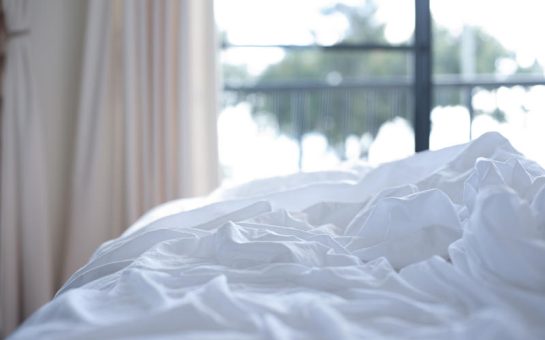How did you sleep last night? If the answer to that question is ‘not well’ then don’t worry, you have a lot of company right now.
We all know that getting a good, uninterrupted night’s sleep makes so much difference to our well-being on every level – productivity at work, sociability and are all-round physical health.
In fact, it’s not really a surprise to learn that when we sleep well our immune system works better.
And right now of course, that couldn’t be more important.
Over the period of the pandemic, speaking to friends and family it’s become noticeable (not surprisingly) how much more stressed everyone is, and also how many times people use that phrase, ‘I haven’t been sleeping well’.
Actually, it’s got a name – coronasomnia – and there’s an article about it here.
Finding it hard to get to sleep and having broken sleep patterns, including the horrible feeling of waking up at 4am and staying awake until you have to get up for work, are common issues.
So this article is a guide for those who are currently suffering from sleep deprivation on some level.
Hopefully, it will make you feel like you’re not alone in this and provide some pointers on how to improve your sleep.
How much sleep do you need?
Knowing how much sleep you need is a good place to start with this as it gives you context and sets a benchmark.
There are a few guides online but generally, the rule of thumb for adults seems to be between seven and nine hours.
It depends on the individual, some require less than others. Margaret Thatcher famously survived on just four hours a night, but that’s not for all of us.
Your general health, levels of physical activity during the day and what you are comfortable with are all important here, so if you feel you can’t function without nine hours of sleep, then you probably need it.
If you want a more scientific approach, you can use the sleep calculator on this page.
What are the effects of sleep deprivation?
We don’t need much explanation about why getting a good night’s sleep is so important.
We’ve all been there when we show up to work and our brain is a bit fogged, our reactions are slower, our focus is not as keen, and socialising is much harder.
If you’ve been unlucky enough to get stuck in a cycle of sleepless nights then you’ll know these effects can become magnified so that you are rarely functioning at anything like your best level.
Of course, the flip side is that after a good night’s sleep we all function so much better.
So, how can you sleep better?
Looking around at online advice there are lots of things that you can do (and not do) to improve your chances of getting a good night’s sleep.
A lot of it seems to come down to reducing stress levels and preparing the environment you sleep in.
Here are some handy tips to help you nod off more quickly and stay asleep once you do.
De-stress before bed
It seems a bit chicken and egg because for many of us a lack of sleep is caused by stress, which in turn causes more stress, but being relaxed is going to help you to nod off.
The pandemic has disrupted everyone’s lives and caused a whole heap of stress around lots of issues.
One way to deal with stress is to write down the things that are stressing you before you go to bed.
Another useful strategy to clear your mind before sleep is meditation.
The objective is to clear your mind of the repetitive thoughts that cycle around as bringing them to resolution, even temporarily, can help.
Physical exercise
It definitely helps to burn off any anxiety during the day by including physical exercises in your schedule.
Running, sport or simple yoga or pilates are great ways to do this.
It also helps if you are outside – getting fresh air is conducive to a good night’s sleep too.
Regular sleep patterns
Working at home has led to a change in schedule for many people and it does feel harder to create a routine when there is no immediate need to leave our home.
But regular schedules are important, including those around sleep.
If you go to bed at the same time each day and get up at the same time each day your body will respond by reaching a stable sleep-wake cycle.
Avoid screen time before you go to bed
Your mobile phone and its screen are the enemy of a good night’s sleep.
We are all guilty of using our phones when we go to bed – to browse social media, catch up on emails, read the news, or even play distracting games.
In particular apps with bright lights, loud noises and the potential to raise your heart rate are to be avoided – for example, video slots like these are especially bad news for insomniacs.
So, whilst all these activities are fine during the day they don’t promote sleep.
It’s scientifically proven that the light from a phone or tablet interferes with the production of melatonin in your brain which is important for regulating sleep, helping you to doze off and then to wake up the next day.
And of course, through the night your buzzing phone alerting you of emails, texts or other messages can interrupt sleep too.
So the general rule is, phones off 30 minutes before you sleep, and keep them on silent and away from your bed to avoid unwanted nudges in the night.
Watch your diet
Finally, keep an eye on what you eat and drink, particularly in the two hours before you go to bed.
Eating a heavy meal just before getting ready to sleep will not help as it will make you uncomfortable, nor will stimulants like coffee or alcohol.
And remember, some of those stimulants can take hours to wear off so if you really want to sleep well it’s best to avoid them completely.


